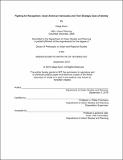| dc.contributor.advisor | J. Phillip Thompson. | en_US |
| dc.contributor.author | Kwon, Haegi. | en_US |
| dc.contributor.other | Massachusetts Institute of Technology. Department of Urban Studies and Planning. | en_US |
| dc.date.accessioned | 2020-02-28T20:50:36Z | |
| dc.date.available | 2020-02-28T20:50:36Z | |
| dc.date.copyright | 2019 | en_US |
| dc.date.issued | 2019 | en_US |
| dc.identifier.uri | https://hdl.handle.net/1721.1/123909 | |
| dc.description | This electronic version was submitted by the student author. The certified thesis is available in the Institute Archives and Special Collections. | en_US |
| dc.description | Thesis: Ph. D., Massachusetts Institute of Technology, Department of Urban Studies and Planning, 2019 | en_US |
| dc.description | Cataloged from student-submitted PDF version of thesis. | en_US |
| dc.description | Includes bibliographical references (pages 88-94). | en_US |
| dc.description.abstract | Nonprofit advocacy organizations play a key role in advancing the rights of disadvantaged individuals and groups. Further, these organizations strategically frame issues and their image in ways that facilitate their ability to mobilize individuals, gain credibility, and sway public opinion. While scholars recognize that immigrant-serving nonprofit organizations have the potential to serve, advocate for, and/or mobilize some of the most disadvantaged communities in the US, there is little focus on organizational identity (very simply, the answer to "who are we as an organization?") and how organizational identities are deployed as a political strategy, especially in a political environment where politicians blame immigrants for damaging the livelihoods of Americans and in which racist and xenophobic rhetoric is increasingly normalized. | en_US |
| dc.description.abstract | I use the example of Asian Americans, a group with tremendous intragroup socioeconomic, cultural, and political diversity, and the nonprofits serving this community, to examine how their identity deployment practices, in conjunction with other factors internal and external to these organizations, relate to social service and advocacy outcomes for immigrant constituents in New York City. Although these organizations differ in multiple ways (e.g., varying levels of attachment with Asian American identity, history, location in the city, constituency, size, organizational capacity, and programmatic and advocacy expertise), they also seek to mitigate organizational uncertainties in the midst of demographic, political, and economic change. | en_US |
| dc.description.abstract | I find three cross cutting themes that contribute to the bulk of my findings: 1) flexible identity deployment and its "mixed" programmatic and advocacy outcomes, 2) boundary maintenance within organizations to maintain organizational legitimacy, and 3) claims of disadvantage relative to other groups. Ultimately, these findings contribute to understandings of the current state of Asian American politics and how these dynamics impact panethnic and multiracial forms of collective action. | en_US |
| dc.description.statementofresponsibility | by Haegi Kwon. | en_US |
| dc.format.extent | 94 pages ; | en_US |
| dc.language.iso | eng | en_US |
| dc.publisher | Massachusetts Institute of Technology | en_US |
| dc.rights | MIT theses are protected by copyright. They may be viewed, downloaded, or printed from this source but further reproduction or distribution in any format is prohibited without written permission. | en_US |
| dc.rights.uri | http://dspace.mit.edu/handle/1721.1/7582 | en_US |
| dc.subject | Urban Studies and Planning. | en_US |
| dc.title | Fighting for recognition : Asian American advocates and their strategic uses of identity | en_US |
| dc.type | Thesis | en_US |
| dc.description.degree | Ph. D. | en_US |
| dc.contributor.department | Massachusetts Institute of Technology. Department of Urban Studies and Planning | en_US |
| dc.identifier.oclc | 1139710373 | en_US |
| dc.description.collection | Ph.D. Massachusetts Institute of Technology, Department of Urban Studies and Planning | en_US |
| dspace.imported | 2020-02-28T20:50:35Z | en_US |
| mit.thesis.degree | Doctoral | en_US |
| mit.thesis.department | UrbStud | en_US |
